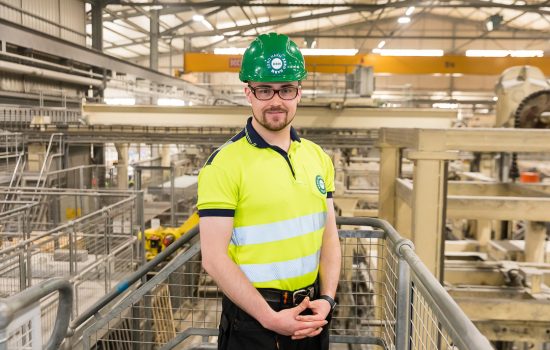

Job Title: Engineering Apprentice
Company: H&H
What is your background and how did you come to be in your present role?
Prior to COVID I was actually in a band. We’d released a few singles and gone on a small UK tour, however, that all stopped once the pandemic and the subsequent lockdowns kicked-in. As someone who’s always had a strong work ethic and been keen on STEM, I decided to go to the University of Leeds and study Chemical and Process Engineering, which suited me down to the ground.
However, as the pandemic was still progressing I found it very difficult. I was living away from home and as a naturally sociable person, it really didn’t feel right. Although I thought I required a degree to get to where I wanted to be, I also felt the need to get into the workforce.
So, I deferred my place with the intention to go back the following year. However, while working part time, I saw that the AMRC was advertising for degree apprenticeships. So I applied to transfer my degree from Leeds to Sheffield.
But of course, as an apprentice, I also had to find an employer and the best option was with an international conglomerate in the mechanical seal and support system industry, which essentially deals with equipment in the chemical and process Industry. That really advanced my career from being a kid fresh from university to a full technical applications engineer.
However, I also wanted to get some on-site experience so I moved to H+H who were coincidentally having issues with their pumps. So, coming from a supplier of these types of systems was very advantageous.
In the last few years I’ve successfully completed my degree and I’ve also been working on a project that has developed very good ROI, particularly in the last 12 months. This has involved specification of our mechanical seals to ensure reliability, efficiency and to maximise lifetime.
Since the end of my apprenticeship I’ve been acting as the Site Planning Engineer, which is the natural next step for me and I’m loving it.
What has been your greatest challenge so far in your career?
There’s been a lot of them but for me it’s probably reading the room. The way I need to communicate with my manager is very different to how I would need to communicate within an academic environment, with the board or with a production operative.
So there’s a lot of different ways to explain things to different people. And as a young person, I came from a degree where I was being asked to write 10,000 word dissertations. That’s great because it can give you fantastic bandwidth.
However, I would write something very different if I was to present a functional design specification within a business – they’d want to see all the necessary information on one page. So, how to communicate with different people was the biggest challenge throughout my apprenticeship.
What has been your greatest achievement so far in your career?
It would have to be the savings made on the pump project. I was lucky because I was hired on the basis that they had issues, and it was a side project where I needed to do my apprenticeship work but was able to work on the pump project at the same time.
It was a proud achievement, and has achieved a massive ROI, with a huge amount of environmental and social savings – everyone’s bought into it.
I’ve also developed software for the business for tracking things like overall equipment effectiveness, MTTRs, MTBFs, reliability indexing, probability of failure etc. If a product is not moving down the line we have sensors all around the site which detect the problem. Production, then put a comment on what the downtime is attributed to, which is then shown on a dashboard.
What that system can’t do is the smarter stuff which will tell us how likely the asset is to fail in the future and the percentage of all the down-time attributed to this asset. Data doesn’t fix the issue, it just points me in the right direction. It gives me information rather than knowledge or wisdom.
So I learned Python coding as a university module, and what I’ve learned has revolutionised data analysis to the point where tasks that were taking ten hours a week can be done in seconds.
What advice would you give to your younger self?
The last man who thought he was perfect got nailed to a cross. I strived for perfectionism a lot when I was younger. Passing exams can make you a five-star student, and in your small pool of people, you might be in the top one per cent.
You then enter the real world where people have been doing the job for a long time, and you have to completely lose your ego. You’re not going to learn from anyone if you think you already know everything.
Be humble. There’s a time and a place to talk about what you’ve done well, but I wouldn’t have achieved what I have in my career so far if I didn’t learn the basics from other people.
How do you think we can raise the profile of careers in STEM?
It’s important for people to understand what manufacturing is. It’s hard to describe and it’s diverse. STEM and manufacturing are both very broad, so don’t get fixated on having to do a certain type of degree or qualification. A teacher might say that you have to follow a set path from GCSE through to A-levels and on to a degree.
They may encourage young people not to do an apprenticeship, but this is wrong. If I had carried on at university I would have left with around £60,000 of debt, no work experience and earning a lower wage that I’m on now – and perhaps a bit of a chip on my shoulder.
What is your favourite engineered/manufactured product?
It has to be the aircrete we make at H&H. Someone else’s waste is turned into a high-strength, low density, highly thermally efficient block.
Please give one interesting fact about yourself that not many people know.
Not many people on-site know that I used to play in a band. I still play guitar, and while we’re not going to go back into playing live, we do have some tracks that we’re going to release this summer.


